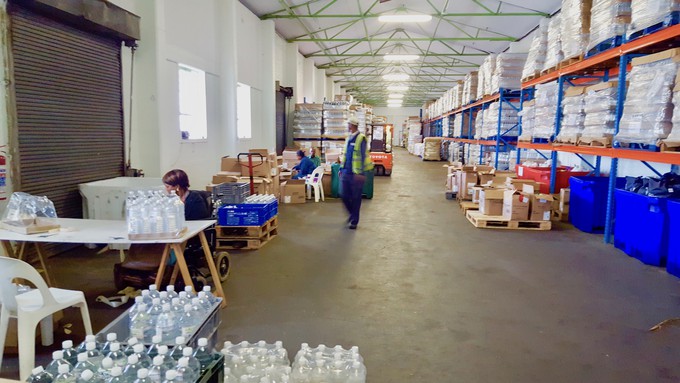
A warehouse in Epping used by FoodForward SA, which redistributes food to over 600 NGOs across the country. Photo: Mary-Anne Gontsana
7 February 2017
Every week dozens of people come for a meal at Maureen Mabanga’s Khayelitsha soup kitchen Sizizihlobo.
Mabanga, who is now 63, started the Sizizihlobo (“We are friends”) soup kitchen in 1996, operating from a tiny shack. At that time she catered mostly for people living with HIV/AIDS.
The soup kitchen was registered with the Western Cape Department of Social Development in 2013, and now offers a meal on Tuesdays and Thursdays to a range of people, young and old. “I would say about 70 or 80 people come through here for food. People are hungry out there and I would never turn people away. Even though we operate two days a week, sometimes I cook the whole week, just for those who have to eat.”
Mabanga gets her supplies from FoodForwardSA, formerly the Food Bank, in Epping. Once a month, she receives vegetables, tinned foods, flour, mealie meal, noodles and even snacks, which Mabanga says she gives to the children.
Sizizihlobo is one of dozens of organisations in Cape Town regularly supplied by FoodForward SA with food which is considered waste by retailers and manufacturers, but which is still edible. “It’s not expired food; it’s just food that has been overproduced, or there is a problem with packaging or food that is short dated,” says Development Manager Kate Hamilton.
“This food will come to us from the retailer and then we sort those foods into baskets; make sure it’s all edible; then, redistribute that food from our warehouses to over 600 NGOs across the country.”
The NGOs are monitored to make sure that there are storage facilities and that the food is being distributed “where it should be,” says Hamilton.
Not only groceries but also household detergents, sanitary wear and nappies are distributed.
“We don’t distribute that much fresh produce any more because we’re linking the organisations directly to the stores that donate to us. So they are collecting from the stores,” explains Hamilton.
She says 14 million people* in South Africa are experiencing hunger on a daily basis. “It differs from region to region. Another fact is that a third of the food we produce is going to waste.”
The FoodBank has helped me and the community so much,” says Mabanga.
* Exactly how many people go hungry in South Africa or how often is not known. Africa Check has looked into the numbers. Their report states: “Statistics South Africa’s General Household Survey, showed that 7,130,625 people reported experiencing hunger in 2015.”
The description of the Africa Check article was corrected after publication.